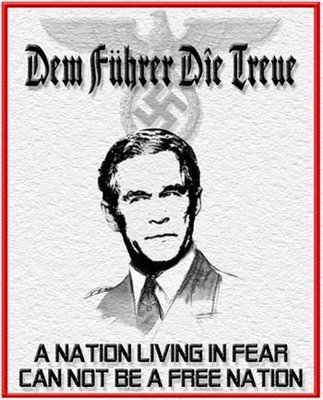
The German in the graphic above says: "Be True [Loyal] To The Ruthless Tyrannical Leader!"
KENTROVERSY COMMENT: Further evidence based upon 'Resident Bush Jr.'s desire to become a dictator, are provided below, in a letter from Congressman Henry Waxman (D-CA), alleging that Bush Jr. knowingly signed a bill into law that hadn't passed the House of Representatives; an act that directly violates Article 1 Section 7 of the U.S. Constitution. Bush and his Neo-Nazi-Con cabal have shown complete distain for the Constitution, which Bush Jr. recently referred to as "just a goddamn piece of paper." This is very similar to the situation surrounding the sixteenth amendment of the U.S. Constitution, which relates to the tax issue, which was never properly ratified before being signed as part of the Constitution February 3, 1913.
This is yet another exmaple of the behavior of Bush Jr., and how he fantasizes about becoming another Hitler type character, whom is paid tribute in the Skull & Bones clubhouse on the Yale University campus, where an altar featuring Nazi memorabilia that has been collected and maintained by the club, can be found in a special room in the basement of the Skull & Bones clubhouse, which is commonly known to members as "the TOMB."
It is also well-known to the truly informed insiders that there is a group called the ORDER OF THE TRAPEZOID whose members dress up in Nazi uniforms and fantasize about their FINAL SOLUTION that they call the NEW WORLD ORDER.
Truly sick and twisted shit from truly sick and twisted minds.
Bush Sr's own father was one of Hitler's primary financiers, and Prescott Bush was charged with breaking the Trading With The Enemy Act, for which he paid a large fine and spent time in prison.
Congressman Writes White House: Did President Knowingly Sign Law That Didn't Pass?
RAW STORY
Wednesday March 15, 2006
Representative Henry Waxman (D-CA) has alleged in a letter to White House Chief of Staff Andrew Card that President Bush signed a version of the Budget Reconciliation Act that, in effect, did not pass the House of Representatives.
Further, Waxman says there is reason to believe that the Speaker of the House called President Bush before he signed the law, and alerted him that the version he was about to sign differed from the one that actually passed the House. If true, this would put the President in willful violation of the U.S. Constitution.
The full text of the letter follows:
March 15, 2006
The Honorable Andrew Card
Chief of Staff
The White House
1600 Pennsylvania Avenue, NW
Washington, DC 20500
Dear Mr. Card:
On February 8, 2006, President Bush signed into law a version of the Deficit Reduction Omnibus Reconciliation Act of 2005 that was different in substance from the version that passed the U.S. House of Representatives. Legal scholars have advised me that the substantive differences between the versions - which involve $2 billion in federal spending - mean that this bill did not meet the fundamental constitutional requirement that both Houses of Congress must pass any legislation signed into law by the President.
I am writing to learn what the President and his staff knew about this constitutional defect at the time the President signed the legislation.
Detailed background about the legislation and its constitutional defects are contained in a letter I sent last month to House Minority Leader Nancy Pelosi, which I have enclosed with this letter.[1] In summary, the House-passed version of the legislation required the Medicare program to lease "durable medical equipment," such as wheelchairs, for seniors and other beneficiaries for up to 36 months, while the version of the legislation signed by the President limited the duration of these leases to just 13 months. As the Congressional Budget Office reported, this seemingly small change from 36 months to 13 months has a disproportionately large budgetary impact, cutting Medicare outlays by $2 billion over the next five years.[2]
I understand that a call was made to the White House before the legislation was signed by the President advising the White House of the differences between the bills and seeking advice about how to proceed. My understanding is that the call was made either by the Speaker of the House to the President or by the senior staff of the Speaker to the senior staff of the President.
I would like to know whether my understanding is correct. If it is, the implications are serious.
The Presentment Clause of the U.S. Constitution states that before a bill can become law, it must be passed by both Houses of Congress.[3] When the President took the oath of office, he swore to "preserve, protect, and defend the Constitution of the United States," which includes the Presentment Clause. If the President signed the Reconciliation Act knowing its constitutional infirmity, he would in effect be placing himself above the Constitution.
I do not raise this issue lightly. Given the gravity of the matter and the unusual circumstances surrounding the Reconciliation Act, Congress and the public need a straightforward explanation of what the President and his staff knew on February 8, when the legislation was signed into law.
Sincerely,
Henry A. Waxman
Ranking Minority Member
Enclosure
FOOTNOTES:
[1] See Letter from Rep. Henry A. Waxman to Democratic Leader Nancy Pelosi (Feb. 14, 2006).
[2] See Letter from CBO Acting Director Donald Marron to Rep. John M. Spratt, Jr. (Feb. 13, 2006).
[3] U.S. Constitution, Article I, Section 7.
© 2006 Raw Story
All rights reserved. Used with permission.
Sources:
The following sources were used in the creation of this Kentroversy Paper . . .
Wall Street and the Rise of Hitler - Antony C. Sutton (1976)
America's Secret Establishment: An Introduction to the Order of Skull & Bones - Antony C. Sutton (1986)
Congressman Writes White House: Did President Knowingly Sign Law That Didn't Pass? - Raw Story (March 15, 2006)
Bush Crime Family
Dictator
Führer
Tyranny
U.S. Fascist State
No comments:
Post a Comment